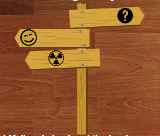December 8, 2014
“How would you like to move forward with radioactive iodine treatment?”, the doctor asks.
I have to decide right now?!
“As I said, given that there is metastasis, I would recommend that you go the route of slowly withdrawing by stopping your thyroid hormone replacement before the radiation treatment, rather than taking the thyrogen injections.” He has explained that he would do either method but has his reservations about the “fast” thyrogen approach being fully effective.
I’ll become really hypothyroid again. I’ll go back to not being able to do anything. I’ll … I’ll… I won’t feel like me. I’ll forget who I am.
I take a deep breath. It’s time to make a tough decision. I hear myself speak, “If I’m going to have to get radiated, I don’t want there to be the possibility of not getting all of the cancer out. I’ll trust you. No thyrogen injections.”
He nods in approval. “I’ll get the paperwork ready”
~~~~~~~~~~~~~~~~~~~~~~~~~~~~~~~~~~~~~~~~~~~~~~~~~~~~~~~~~~~~~~~~~~
Looking back, I honestly don’t know how I was able to make that decision. Every cell in my body was screaming to not put them through a prolonged state of being hypothyroid. I know it was probably the right decision of the two, at least in the long term.
The premise of radioactive iodine treatment is that my TSH level (thyroid-stimulating hormone or thyrotropin) needs to be super high for it to be effective. This is because TSH is what stimulates the thyroid tissue to take up iodine….including radioactive iodine. All the thyroid cells, both normal and cancer will then essentially take up the radioactive iodine and then self-destruct.
| Option 1: Withdrawal from Thyroid Hormone Replacement | Option 2: Thyrogen Injections | |
| What is it? | My Thyroxine (Synthroid) Pills are my thyroid hormone replacement. I would have to stop taking them for some time to raise my TSH levels. (source) | “Thyrogen® (thyrotropin alfa for injection), produced by biotechnology, is a protein whose properties are similar to natural human thyroid-stimulating hormone (TSH).” (source)The injections would raise my TSH levels rapidly in a few days. |
| Pros | More reliable in getting rid of all the remaining cancerous cells | Can avoid hypothyroidism because will keep taking thyroid hormone replacement |
| Cons | Will go into a state of hypothyroidism again | Costs upwards of $1000 and not covered by OHIP |
| Schedule |
Dec 2014: Stop Thyroxine Feb 2015: Radioactive Iodine |
Day 1: First Thyrogen Injection
Day 2: Second Thyrogen Injection Day 3: Radioactive Iodine |
I don’t know how to effectively convey the horror of that instant. Having to make a decision, in a limited time span with only the information I had (and no power to see into the future), and having just broken down into a mass of tears outside the office, I felt like I had sentenced myself. Sentenced myself to more months of nausea, headaches, fatigue, depression, muscle aches, (not good) weight gain, cold shivers, irritability and more. Sentenced myself to continue fighting with my body and my mind. Sentenced myself to bringing more tough times on the people I care about. I asked the doctor how I was supposed to continue going through “this”. He shrugged. Not in a hurtful way because the truth is, he doesn’t know.
This seems the appropriate time to mention that I have changed endocrinolgists. My surgeon had offered me one affiliated with the same hospital where I had the thyroidectomy so he had access to all my pathology reports. He said he’d heard good things about the endocrinologist. We figured it was worth trying, especially after the smile-while-delivering-cancer-diagnosis trick the previous one had pulled.
This appointment happened a few weeks ago. I sometimes catch myself rethinking radiation treatment. It’s been occupying my thoughts more frequently. The doctor laid out clearly that he thinks it is the best choice to take to make sure we get rid of all the cancer. It’s spread and it’s aggressive. It makes sense to go through with it.
But…oh there are so many “buts”.
But what if I get leukemia in the future…
But what if my saliva glands are destroyed…
(doctor’s response, “that sometimes does happen”)
But what if it affects my ability to get pregnant…
(doctor’s response, “we’ll take the necessary precautions and cover the ovaries”)
But what if the cancer never does spread further…
But what if I don’t really need it…
The next question then, is this – What if I don’t go through with the radiation? And when and how does that tough decision get made?